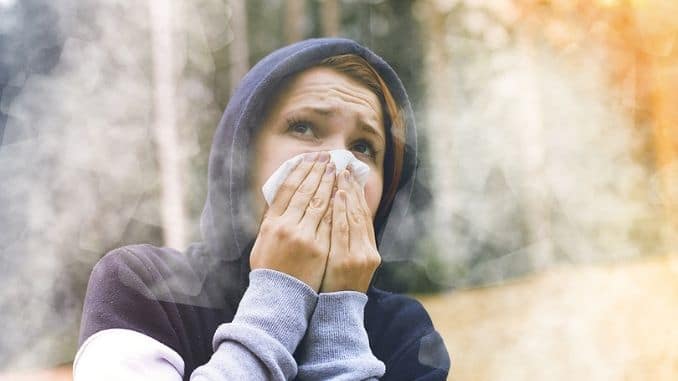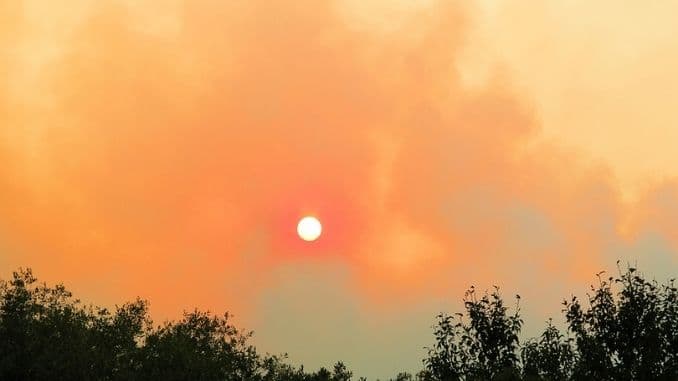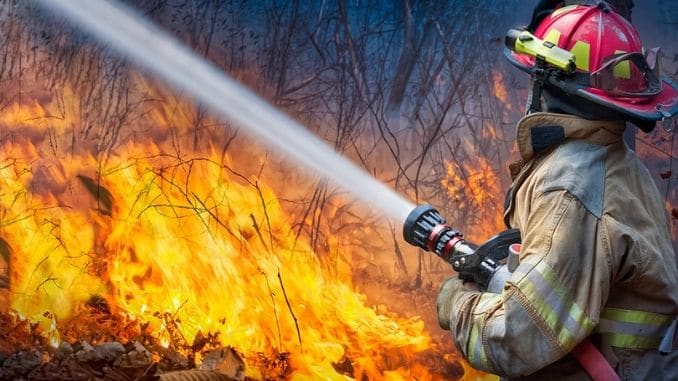
If you live anywhere along the western coast of North America or other parts of the world that experience hot, dry summers, you’ve likely been affected by wildfire smoke. Have you wondered how the smoke in the air could be affecting your health? We spoke to some residents about their experiences and consulted with leading health experts to determine just how bad wildfire smoke is for your health and what you can do to mitigate the damage.
Joe Woritz, 58, of San Francisco woke up at 8 am on a Wednesday to begin work. Immediately he wondered if the clock was wrong because it was still dark outside. Woritz said, “Smoke was covering the sun. It was very dark outside with an orange glow. It was strange and apocalyptic.” Woritz added, “The air was so bad that I couldn’t go outside. I also had to warn my mom not to have her windows open or go out. The air quality index was over 200 for several days.”
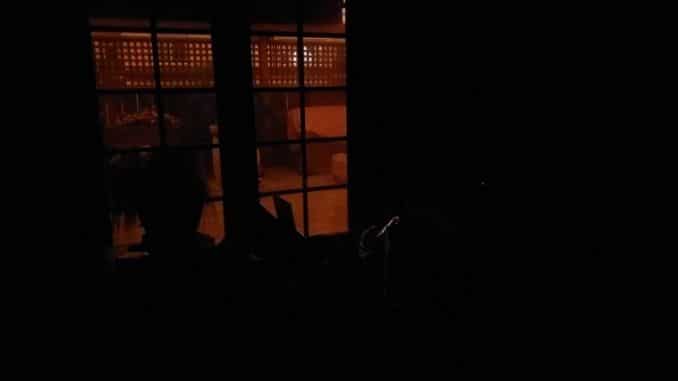
Woritz was wise to warn his mother, who is 85 years old, not to have her windows open or go outside while nearby fires were burning forests, homes, and buildings throughout California. New research out of Stanford University estimates that the state of California alone saw nearly 5,000 extra emergency room visits from residents over the age of 65 during the worst month of 2020 wildfires. There was also an increase of 1,200 deaths among California’s elderly population during that same time frame.
According to the United States Environmental Protection Association (EPA), “The biggest health threat from smoke is from fine particles. These microscopic particles can get into your eyes and respiratory system, where they can cause health problems such as burning eyes, runny nose, and illnesses such as bronchitis.” The EPA also warns that the fine particles found in wildfire smoke can also aggravate conditions like chronic heart and lung diseases.
Lucia Stakkestad, 42 of West Seattle, shared that the air quality ratings in her area were at 294 in September. Stakkestad said, “We didn’t go outside for a week.” Stakkestad homeschools her children and kept them indoors while the air quality was bad.
When she did have to leave her home to shop for essentials, Stakkestad said, “It smelled like a campfire outside. I could breathe but it didn’t feel very good. I had been sick previously and was trying to recover. My lungs were hurting at the end of the week.”
Stakkestad likely felt pain in her lungs because of the fine particle respiratory irritants in the smoke that she was inhaling. According to the EPA, these fine particles can cause persistent coughing, phlegm, wheezing, and difficulty breathing. This type of fine particle exposure from wildfire smoke can result in an overall reduction in lung functioning.
Keeping her children indoors for the week was also a smart decision for Stakkestad. According to AirNow.gov, home of the U.S. Air Quality Index, “Children are usually more active outdoors than adults, and they breathe more air per pound of total body weight, so their exposure to air pollution is greater than adults. In addition, their lungs are still developing.”
Marilyn James, 58 of Modesto, California is a nurse in the intensive care unit of her hospital. James said, “We have seen smoke and fires here on the coastal range from time to time, but never this much.” James told us that her vehicles and property were covered with ash during the worst days of the wildfires. “We live in the country and always get tan-colored dust. But this was different; it was sand-like with white and black particles.”
James and her husband decided to travel to San Francisco to visit their son for his 22nd birthday. She said, “We were hoping for clean air. But it was horrible in San Francisco too.”
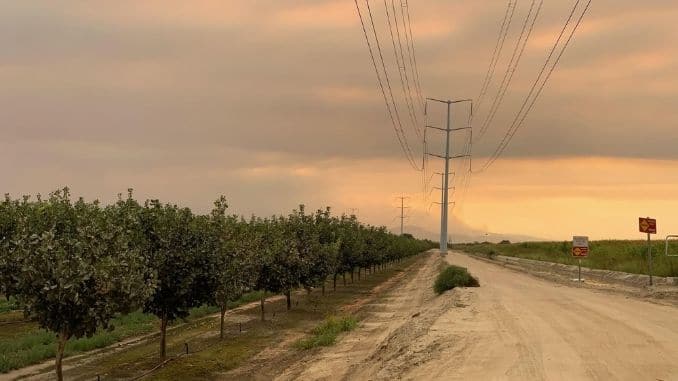
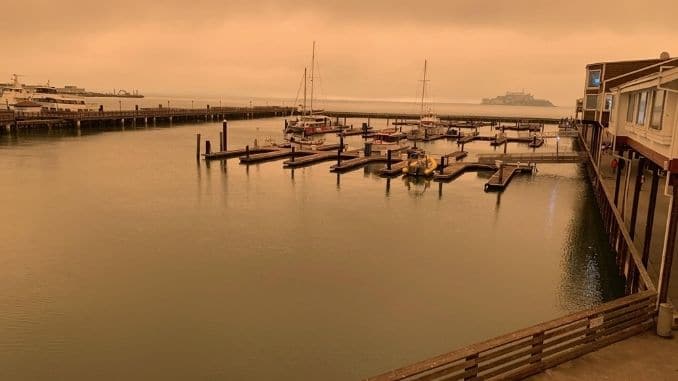
Who is most at risk for health problems from wildfire smoke?
While even healthy individuals can experience negative effects of wildfire smoke, there are some groups of people that are especially sensitive. A person is more at risk if he or she falls into one of these categories:
- Adults over age 65 – Elderly people are especially at risk for complications due to wildfire smoke. A 2018 study published in the Journal of the American Heart Association found an association between wildfire smoke exposure and cardiovascular and cerebrovascular health problems. The researchers found that older adults had higher instances of stroke, heart failure, ischemic heart disease, pulmonary embolism, and dysrhythmia in areas with poor air quality due to wildfire smoke.
- Pregnant women – Aside from respiratory problems for pregnant women, exposure to wildfire smoke may pose a threat to unborn children. Current research out of the University of California Davis (UC Davis) has shown a correlation between wildfire smoke exposure in pregnant women and lower birth weight of their babies.
- Babies and children – Developing lungs are vulnerable to air pollution of any kind. A child’s lungs are not developed until they are fully grown, young adults. Smoke from wildfires can reduce a child’s lung functions. Also, children are more susceptible to asthma than adults. Wildfire smoke exposure can lead to asthma attacks and breathing complications. Concerning babies, researchers from Stanford University have recently stated that infants who are exposed to wildfire smoke for just one week are twice as likely to develop asthma as children.
- People with asthma, COPD or lung disease – According to the Allergy and Asthma Network in Virginia, “Wildfires can cause lung irritation and inflammation when you inhale small particles of smoke, leading to coughing, wheezing and shortness of breath.” Of course, this kind of response can be very serious for people with lung disease, asthma, or COPD.
- People with heart disease – Research from the American Heart Association has found that people with heart disease or any heart problems are more prone to adverse heart events in areas of active wildfires and poor air quality.
- Smokers – Those who smoke cigarettes may likely experience more wheezing, shortness of breath and coughing spells when also exposed to wildfire smoke. The overall lung health of people who smoke is already poor. Wildfire smoke exposure will intensify the lung damage and cause discomfort while breathing.
- Anyone with a weak immune system – Italian researchers have found that air pollutants, similar to those found in wood smoke, can suppress the body’s ability to clear out viruses in the lungs. If your immune system is already weak, exposure to wildfire smoke could make your body even less effective at fighting off pathogens.
Healthy adults can also be negatively affected by wildfire smoke. According to the United States Centers for Disease Control and Prevention (CDC), “Wildfire smoke can make anyone sick. Even someone who is healthy can get sick if there is enough smoke in the air.” Healthy adults can experience immediate symptoms like coughing, trouble breathing, irritated sinuses, headaches, rapid heart rate, and wheezing. Even a person that does not have asthma or breathing problems can experience asthma attacks when exposed to wildfire smoke. Prolonged exposure to wildfire smoke can have lasting health effects.
There are ways to stay healthy if your home is in an area with wildfire smoke. If you haven’t been urged to evacuate your home, but the air quality levels are still very poor, there are still ways to minimize your exposure to wildfire smoke.
- Keep an eye on the air quality index (AQI) above. The United States Environmental Protection Agency has created an air quality index to rate the air for particle pollution. (See the image from EPA.gov above.) When you hear the AQI reported on the news, the above guide will help you determine if it’s safe to go outside.
- Stay inside. If you have a health condition that’s affected by wildfire smoke, stay inside when the AQI begins to approach or exceed 100. Adults without health conditions should plan to stay inside when AQI ratings are north of 150.
- Keep windows and doors closed. When the AQI has indicated unsafe levels, make sure you’re keeping your house closed up so that the inside air stays clean. If your windows aren’t airtight, use plastic wrap around drafty areas and seal the edges with tape. Heavy drapes will also help if you don’t have plastic handy.
- Avoid using the vacuum. Take a few days off from vacuuming the floors. When you use the vacuum, it stirs up air particles which can diminish your indoor air quality. Save your floor cleaning for a day when the outside air is cleaner and you can open up the house.
- Use the air conditioner wisely. If you are using your air conditioner or heater, be sure to set the units on “recirculate air” instead of using air from the outside. Check the owner’s manual on your HVAC units to be sure you’re keeping wildfire smoke outside where it belongs.
- Use an air purifier if you have one. If you can find a high-quality air purifier, use it.
- When you must go out, use an appropriate mask. Dust masks are not helpful to filter out fine particles during wildfire season. You will need to get your hands on an N-95 mask and wear it correctly.
- Recirculate the air in your car. There’s a little button near the air conditioning controls on your car that looks like arrows going in a circle. Press that button to ensure you’re keeping the smokey air out of your vehicle.
- Get out of Dodge. The above suggestions are helpful if you have no choice but to stay in the area. However, if you have the option to leave town until the air has cleared up, consider doing so. Even if authorities haven’t recommended a full evacuation of your neighborhood, cleaner air is always better for your health. If you can get away to a city that isn’t full of smoke, do it.
With acres and acres of forests, homes, buildings, and lands burning this wildfire season, it’s more important than ever to take precautions so that you can protect your health. Stay informed and stay safe during this difficult and dangerous time.
Finally, all-natural and easy ways to heal your entire cardiovascular system… without dangerous medications or harmful side effects. Click here for more info.

